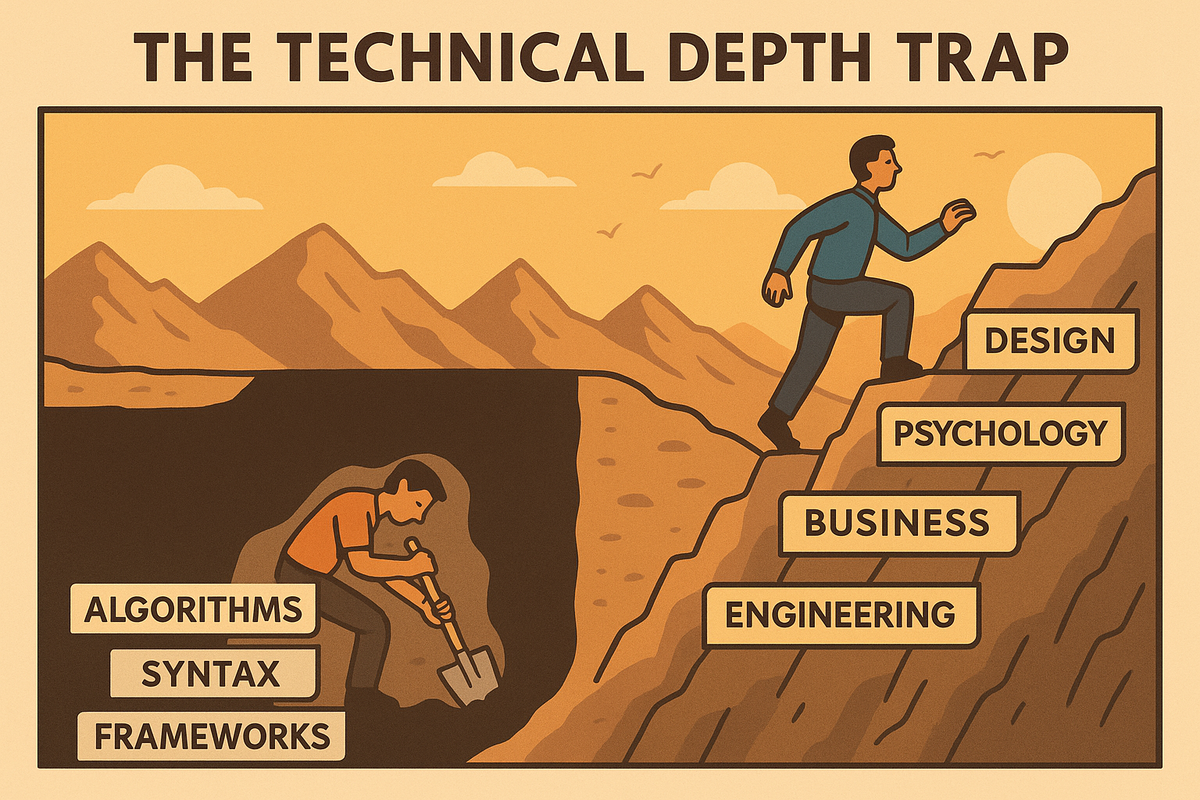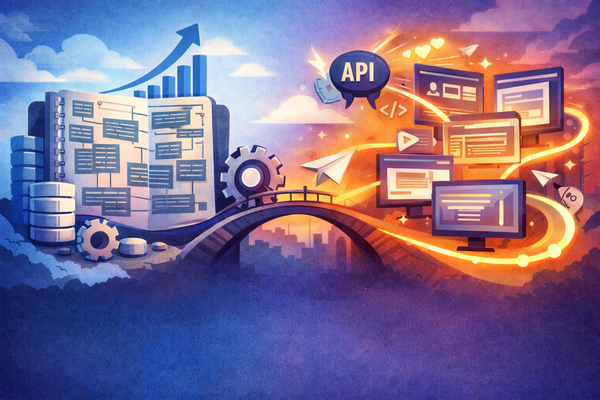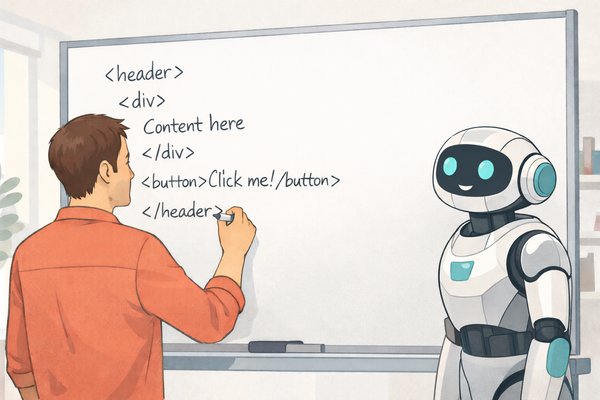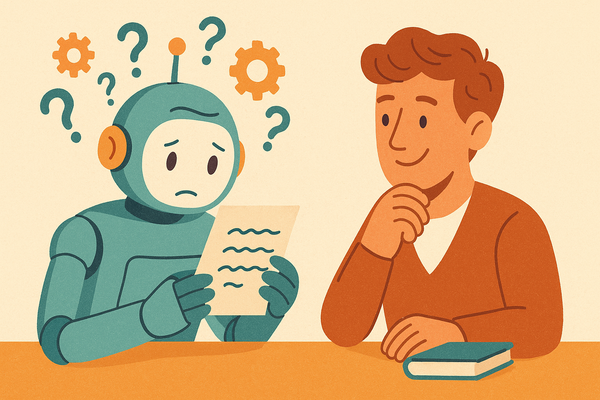In the AI Age Here's Why Range and Experience Beat Technical Depth: The Counter-Intuitive Truth About Engineering Careers Today

How my "unfocused" career accidentally proved David Epstein's thesis—and why the best AI engineers aren't the ones who can code the fastest.
Your command of quicksort, or your rote memorization of dynamic programming algorithms won't spare you from the impending shift that is coming for software engineers in the AI age.
Earlier in my career, I learned this the hard way. I bombed a technical interview spectacularly when the interviewer asked me to implement dynamic programming solutions on a whiteboard. I fumbled through explanations of algorithms I'd memorized but never really understood.
"You're not really a 'real' engineer, are you?" the interviewer said. Ouch.
I'm admittedly biased, championing a wave of technology that undercuts the rote memorization that has built the gates to innovation many of my colleagues have kept for decades.
While many of my colleagues wallow in denial of the impending knowledge worker transformation driven by language models that have memorized and can regurgitate engineering solutions faster than the most eidetic savant from Cambridge, the innovators of this next stage in tech leverage not a depth of knowledge but a breadth of experience.
This shift is backed up by findings from David Epstein's groundbreaking research in Range: Why Generalists Triumph in a Specialized World and echoed by AI leaders like Andrew Ng and Jensen Huang: In the AI age, range and cross-domain experience consistently trump pure technical depth.
Here's a story that proves this point: The most successful AI engineer I know can barely write a for-loop from memory.
That engineer is my friend Brad. He started out on a trading floor at JP Morgan, managed M&A for the same firm in Sydney, and is now rebuilding the lending process at his firm in Park City using Claude Code and Warp. What makes Brad such a powerful coder in the AI age isn't his ability to grind LeetCode—it's his analytical thinking, his real-world problem-solving skills, and his domain expertise.
This might be why Brad and I get along so well. We both focus on range of knowledge over technical depth. Early in my career I bounced between psychology, marketing, product management, and eventually engineering. It looked like career ADHD. It felt like I was always behind the "real" engineers who'd been coding since they were twelve.
But here's what the research reveals about why this wandering path is actually the winning strategy:
What David Epstein's Research Really Reveals
David Epstein's groundbreaking research in Range: Why Generalists Triumph in a Specialized World destroys our assumptions about expertise. His key finding: "In most fields—especially those that are complex and unpredictable—generalists, not specialists, are primed to excel."
But here's the part that directly challenges Gladwell's "10,000 hours" mentality that dominates technical education: Epstein found that early specialization is actually the exception, not the rule among top performers.
Consider his research on 3M inventors. The company analyzed patent records of specialists versus generalists. The result? "Neither the inventor's breadth nor depth predicted the likelihood of winning the company's Carlton Award (the 'Nobel Prize of 3M'). Instead, the strongest predictor of success was a specialist who repeatedly took their expertise in one core domain and applied it to a different domain."
This is exactly what's happening in AI engineering—the most successful practitioners aren't the ones with the deepest algorithms knowledge, but those who can apply technical capabilities across different domains.
The Claude Shannon Principle
Epstein tells the story of Claude Shannon, the electrical engineer who ushered in the Information Age. Shannon's breakthrough came not from deeper electrical engineering study, but from an unusual combination: "To fulfil an undergraduate requirement, Shannon took a philosophy course in which he learned Boolean logic; then, during a summer internship at AT&T Bell Labs, he recognized that he could combine telephone routing-technology with Boole's logic system to encode and transmit any type of information electronically."
If Shannon had only focused on electrical engineering depth, we might not have computers as we know them.
This pattern—breakthrough innovation through cross-domain connection—is exactly what AI engineering demands today.
My Accidental Range Experiment
Looking back, my career was an unintentional test of Epstein's thesis:
Psychology (2006-2008): Taught me how humans actually think and make decisions—crucial for designing AI systems that people will actually use.
Marketing (2008-2012): Showed me how to communicate complex technical concepts to non-technical stakeholders—essential for AI adoption in organizations.
Information Systems Graduate School (2012-2013): Bridged business needs with technical capabilities—the foundation of successful AI implementation.
Product Management (2013-2016): This was the game-changer. As a PM, I became what I now recognize as a "proto-context engineer." I gathered information from stakeholders, organized that context into actionable stories (prompts) for engineers, wrote broad goals in product requirement documents, and evaluated engineering output.
What I didn't know was that I was learning to become a good context engineer—the most valuable skill in the AI age.
Full-Stack Engineering (2016-2024): Finally learned to implement, but with the crucial advantage of understanding the "why" behind technical decisions.
AI Consulting (2024-present): All previous experiences suddenly became incredibly valuable for helping organizations navigate AI transformation.
Each transition felt like starting over. But in reality, I was building what researchers call "far transfer"—the ability to apply knowledge across seemingly unrelated domains.
Why Technical Depth Alone Fails in AI
Here's the uncomfortable truth: Pure technical depth is becoming less valuable in the AI age, not more.
Consider what GitHub's 2024 research reveals: "AI coding tools are now central to software development" and "AI is driving productivity (up by 55%) and improving code quality." When AI can generate code faster than humans can type it, what's the real value of memorizing syntax?
Gartner research found that "Through 2027, generative AI will spawn new roles in software engineering and operations, requiring 80% of the engineering workforce to upskill." They specifically noted the emergence of "skills half-life" as a concern—"technical expertise is becoming obsolete faster than ever."
When technical knowledge expires this quickly, adaptability matters more than depth.
The Nintendo Case Study: Range in Action
Epstein documents a fascinating example of how range beats depth in technology companies. Nintendo's Game & Watch handheld games dominated the market not through cutting-edge technology, but through creative recombination of existing tech by generalists.
Gunpei Yokoi, Nintendo's legendary designer, explicitly followed what he called "lateral thinking of withered technology"—using mature, inexpensive technology in novel ways. This approach required "strong generalists working alongside technical specialists."
Sound familiar? This is exactly what's happening in AI engineering today. The most successful AI applications aren't using the most advanced models—they're using existing technology in creative ways to solve real business problems.
What AI Leaders Actually Value
Andrew Ng, one of the most influential figures in AI, emphasizes this in his career guide: "Andrew Ng emphasizes the importance of lifelong learning. In the field of AI, knowledge and technology evolve rapidly, requiring professionals to constantly update their skills."
Notice he doesn't say "get deeper in your specialty." He says "constantly update"—which requires breadth and adaptability.
Jensen Huang, NVIDIA's CEO, goes further. He tells students: "If I were a student today, irrespective of whether it's for math or science or chemistry or biology — doesn't matter what field of science I'm going into or what profession — I'm going to ask myself, 'How can I use AI to do my job better?'"
The emphasis is on application across domains, not deeper technical mastery within a single domain.
The Research on Cross-Domain Advantage
MIT Sloan research reinforces this: "In today's world of rapid, nonstop technological change, imagination is key. Leaders need to adopt a change mindset in order to absorb knowledge and deploy it strategically. The ability to engage in nuanced decision-making can help humans stay employable as artificial intelligence and machine learning continue to ascend."
"Nuanced decision-making" doesn't come from technical depth—it comes from having multiple frameworks and experiences to draw from.
Career strategist John Tarnoff captures this perfectly: "we were looking for 'specialized generalists' or 'generalized specialists.' Generalists have to bring their wide-ranging perspective and strategic insight to focus on a particular area of expertise. And specialists have to be more nimble and aware of what's going on around their specialty."
How Range Wins in Practice
Let me give you a concrete example. Just last month, an industrial lift company approached me to completely rebuild their front-end interface. They were convinced they needed a full UI overhaul and new landing pages to "modernize their web presence."
But after digging deeper into their actual business needs, I discovered they really just wanted to sell one of their light duty products directly on their website. Instead of a months-long front-end rebuild, the solution was adding a simple button and integrating any number of stock e-commerce tools—a few hours of work, not a few months.
My range of experience in marketing helped me ask the right business questions, while my technical background let me identify the simplest path forward. A pure technical approach would have given them exactly what they asked for: an expensive, over-engineered solution to a simple problem.
The Context Engineering Revolution
Here's what I've learned about modern AI engineering: It's more like product management than traditional coding.
When I work with AI tools now, I:
- Define what the system should accomplish (product strategy)
- Set clear requirements and constraints (requirements gathering)
- Provide context and examples (prompting)
- Evaluate outputs against business goals (product validation)
- Iterate based on real-world feedback (product iteration)
I'm not saying PMs are prompting engineers as if they are mindless automatons—that point has been made before and I strongly disagree (see my previous post on how we treat employees like GPT and how both deserve better). What I am saying is now more than ever communication and alignment between both people AND AI is important if we are to collaborate to build something beautiful.
This looks remarkably similar to product management work. And guess what? The skills that made me effective at PM work—cross-domain knowledge, stakeholder communication, requirement translation—are exactly what make me effective at AI engineering.
Why Deep Specialists Struggle
Pure technical specialists face a unique challenge in the AI age. Research from UC Berkeley notes: "even as AI introduces ever-increasing complexities and responsibilities into leadership roles, the intrinsic value of visionary thinking becomes paramount."
Visionary thinking requires the ability to see connections across domains—exactly what range provides and deep specialization often inhibits.
I've watched brilliant algorithms specialists struggle with AI engineering because they miss the forest for the trees. They optimize for model performance metrics without understanding user needs. They build technically elegant solutions that nobody wants to use.
Meanwhile, engineers with range—who understand both technical capabilities and human needs—build AI systems that actually get adopted and create value.
The Uncomfortable Truth About Technical Interviews
Remember that disastrous technical interview where I couldn't implement dynamic programming? That interviewer was measuring the wrong thing.
He was testing whether I could regurgitate algorithms I'd memorized. But in the AI age, that's exactly the kind of work that gets automated first. GitHub's research shows AI coding tools are already generating most routine algorithmic code.
What can't be automated? The ability to understand what problem actually needs solving. The skill to communicate with stakeholders who don't understand technology. The experience to recognize patterns across different domains and apply solutions creatively.
These meta-skills—these range advantages—are what separate valuable engineers from code generators.
The Science of Far Transfer
Epstein documents extensive research on "far transfer"—the ability to apply knowledge across distant domains. The key finding: "Generalists often find their path late, and they juggle many interests rather than focusing on one. They're also more creative, more agile, and able to make connections their more specialized peers can't see."
This cognitive flexibility is exactly what AI engineering demands. You need to understand:
- Technical capabilities (what can AI actually do?)
- Business constraints (what problems are worth solving?)
- Human factors (how will people actually use this?)
- Domain specifics (what are the unique requirements of this industry?)
No amount of technical depth in machine learning can give you this breadth of understanding.
The Career Implications
If you're early in your engineering career, this research suggests a radically different approach than what most computer science programs teach:
Instead of: Drilling deeper into algorithms and data structures Try: Understanding adjacent domains like design, psychology, business
Instead of: Memorizing frameworks and languages Try: Learning how different industries actually work
Instead of: Optimizing for technical interview performance Try: Building real systems that solve real problems
Instead of: Specializing early Try: Sampling broadly and finding unexpected connections
The Future Belongs to Translation
Here's my prediction: The most valuable engineers in the AI age won't be the ones who can build the most sophisticated models. They'll be the ones who can translate between technical possibilities and human needs.
These translation skills come from range, not depth. They come from understanding multiple domains well enough to see unexpected connections. They come from the career wandering that guidance counselors discourage but that research shows creates the most valuable professionals.
Conclusion: Embrace the Wandering Path
Looking back at my "unfocused" career, I now see it wasn't a bug—it was a feature. Every seemingly unrelated experience built my range, and that range is what makes me valuable in the AI age.
David Epstein's research proves this isn't just anecdotal. In complex, rapidly changing fields—which definitely includes AI engineering—generalists consistently outperform specialists.
So if you're worried that your non-traditional background makes you less qualified as an engineer, stop. If you're considering exploring domains adjacent to your technical specialty, do it. If you're choosing between going deeper in your current focus or building broader capabilities, choose breadth.
The AI age rewards range over depth, experience over specialization, and translation skills over technical virtuosity.
Your wandering path isn't a career mistake. It's your competitive advantage.
What's your range story? How has cross-domain experience helped your engineering career? I'd love to hear how you're applying breadth over depth in the AI age.
Also I seriously suggest picking up David Epstein's "Range: Why Generalists Triumph in a Specialized World". It will fundamentally change how you think about career development and expertise.




